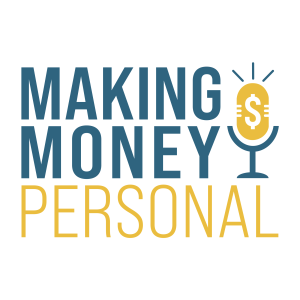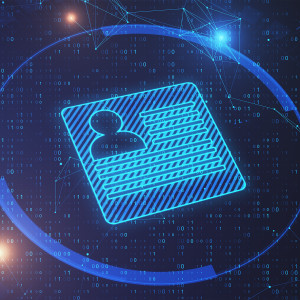Episodes

Tuesday Nov 15, 2022
Tips to Avoid Scalpers this Season - Money Tip Tuesday
Tuesday Nov 15, 2022
Tuesday Nov 15, 2022
During the holiday season, it isn’t uncommon for a popular toy, game console, electronic device, or other popular gift to be sold out quickly. Unfortunately, some people like to take advantage of your holiday spirit and raise the price of popular products. Here are some ways to avoid scalpers and price gouging this holiday season.
Links:
Check out CamelCamelCamel to keep an eye on price fluctuations
Check out our Holiday Shopping Quiz Money Tip Tuesday episode to check your fraud prevention skills
Follow our Facebook, Instagram and Twitter pages!
Learn more about Triangle Credit Union
Transcript:
Welcome to Money Tip Tuesday from the Making Money Personal podcast.
Scalpers are people who figure out what the hot gift Items of the year are, buy a bunch of them until the stores are sold out and then sell the items at an upcharge of anywhere from a 50% to 200% increase. Some scalpers even use bots to buy up popular gift items and then list them from double to ten times the suggested retail price, not giving shoppers a fair chance to even click the purchase button.
It may be tempting to buy from them so you can get your hands on that gift, but don’t do it. Buying from them helps their scheme and also encourages other people to do the same. Also, if the scalpers see that people are buying at already ludicrous prices, it's probable that they will keep increasing the prices as their stock gets lower.
Want to avoid scalpers and getting price gouged? One thing you can do is get your holiday shopping done early. If you know what you plan on getting someone and you see it available, buy it before it’s too late.
Always know what the suggested retail price of the product is and what the trend of the price is. You’re less likely to get extorted this way. Camelcamelcamel offers an Amazon price tracker so you can see how much the price has changed and shop accordingly. There may be small price fluctuations based on the product’s availability but at least if you use this tool, you know you’re more likely to get a fair price.
Also make sure to be aware of who you are buying from. Places like Amazon and Walmart offer a lot of third-party sellers which may not be as trustworthy and up the price of hot items. If you can’t find the hot gift anywhere, but then see it on a website you’ve never heard of at a reasonable price, it’s probably a scam and not a legitimate store.
Want to know if you know how to shop safely online? Check out our online holiday shopping quiz and see how you do!
If there are any other tips or topics you’d like us to cover, let us know at tcupodcast@trianglecu.org and don't forget to like and follow our Making Money Personal Facebook, Instagram, and Twitter pages and look for our sponsor, Triangle Credit Union on Instagram and LinkedIn to share your thoughts.
Thanks for listening to today’s Money Tip Tuesday and be sure to check out our other tips and episodes on the Making Money Personal podcast.
Have a great day!

Tuesday Nov 08, 2022
How to Avoid Advance Fee Scams - Money Tip Tuesday
Tuesday Nov 08, 2022
Tuesday Nov 08, 2022
Have you ever received an offer that seemed too good to be true? If you’re getting emails or text messages excitedly telling you that you’ve won some sort of prize, think twice before taking on the offer, it’s likely an advance fee scam.
Links:
Visit the Federal Trade Commission website to learn more and report fraudulent activity
Follow our Facebook, Instagram and Twitter pages!
Learn more about Triangle Credit Union
Transcript:
Welcome to Money Tip Tuesday from the Making Money Personal podcast.
An advance fee scam is a scam that offers you money, a prize, a special discount or other offer in exchange for a fee.
Scammers try to do this in specific ways, and especially in ways you’re not likely to notice.
They develop well-crafted messages that are designed to entice you to take specific actions to get you to pay them money. Fortunately, we’ve all grown more skeptical of any offers we get through email, but it’s important to remember that scammers are always changing tactics and trying new things to catch people off guard.
So how can you spot these scams? There’s a wide variety of advance fee scams out there so keep an eye out for some of these different tactics or any that seem similar.
Scammers may try to offer you loans without requiring any credit check. If you fall for their offer and apply, they then ask you to pay a fee for processing, insurance or anything else. Once they get the payment they disappear to never be heard from again.
Some may email or message you with a special offer for free or discounted tickets to a big event, concert or other type of experience. Everything about the message may appear legitimate, but if you fall for the scam and pay the money, they’ll take the money, disappear, and you’ll never get your tickets. If you receive any offer or prize that looks like it’s from a company you recognize, contact that company directly to confirm they sent the message.
Like the scam offering free or discounted tickets, other messages might claim that you’ve won a prize, large sum of money, or the lottery. Scammers will hook you into thinking you’re a winner and then ask you to pay a fee in order to collect the money. Like all the other examples, they’ll take the money and disappear.
Keep an eye out for scammers offering business opportunities or offers to work from home or start your own. They’ll hook you in with an attractive ad and offer all kinds of benefits like flexible work hours. Then they’ll require you to pay a registration or startup fee to get started. Make sure that any business opportunity you pursue is legitimate by researching the company name online and with the Better Business Bureau.
Other advance fee scams to keep an eye out for can be found in the world of online dating. Scammers pretend to be individuals looking to find dates or relationships. They take the time to build a relationship with an unsuspecting person and over time build their trust. Then eventually they pretend that they need help with money, whether it’s money for a travel visa, family issues or other life problems. Once they get you to pay them the money they simply disappear.
As you’ve probably realized by now, different types of advance fee scams can range from simple to complicated.
When you receive any message promising you a shockingly good offer or anyone you don’t know asking you for money, you must be on guard, because those offers are most likely scams.
Remember these top tips when it comes to suspicious messages.
Don't react quickly, even if the message seems urgent
Don’t click any links
Don’t open any attachments
Report it
Delete it
Scammers are always coming up with new and sinister ways to get you to hand over your money. Don’t fall for it. Keep an eye out for anything suspicious that comes in through email, text or over the phone. Remember these tips and stay vigilant to keep yourself safe from being scammed.
If there are any other tips or topics, you’d like us to cover, let us know at tcupodcast@trianglecu.org. Like and follow our Making Money Personal FB and IG page and look for our sponsor, Triangle Credit Union on social media to share your thoughts.
Thanks for listening to today’s Money Tip Tuesday and be sure to check out our other tips and episodes on the Making Money Personal podcast.
Have a great day!

Tuesday Nov 01, 2022
Top Reasons to Talk To a Financial Advisor - Money Tip Tuesday
Tuesday Nov 01, 2022
Tuesday Nov 01, 2022
We all know we should probably talk to a financial advisor at some point in our lives, but we don’t always recognize the needs that arise where a financial advisor’s expertise will help you successfully navigate life’s changes.
Links:
Learn more about Triangle Financial Group
Follow our Facebook, Instagram and Twitter pages!
Learn more about Triangle Credit Union
Transcript:
Welcome to Money Tip Tuesday from the Making Money Personal podcast.
There are many times in life where it’ll be beneficial to chat with a financial advisor. Whenever you go through a life-changing event, talking to a financial advisor can help you make the right financial decisions at the right time. So here are some life events when you’ll want to consider chatting with a financial advisor.
The first time to chat with an advisor is when you get married. Getting married is a big step in life. You have a lot of new financial decisions to make together like buying a home (if you haven’t already), whether to get life insurance and how much you’ll need, plus you’ll want to discuss planning for your future and retirement. Financial advisors can help you organize your finances, and they’ll help you work through setting financial goals as a couple, by helping you determine what you’re saving for, and how to properly take the right steps to reach those goals on time.
Another reason you’ll want to reach out to a financial advisor is when you have a new baby. If you just had your first child, it’s a good time to start thinking about how this change will affect you financially. Advisors can help you set up college planning funds, savings accounts and other types of saving options for your children. They can help you determine how best to prepare for your child’s financial future, even if your child is only a few months old. Growing your family is a big life choice and you will benefit greatly from talking with a financial advisor to make sure your family has a stable financial foundation.
A third reason to chat with a financial advisor is due to divorce or the death of a spouse. If you’re going through a divorce or recently lost a spouse, it’s a good time to have some important conversations with a professional. Advisors will help you manage your money especially after you’ve gone through an emotional and life-changing event. It’ll also be helpful to have someone unrelated to you helping you make money decisions that can be confusing, emotional or too exhausting for you to make on your own.
And the last one, if you receive an inheritance. If you’ve just received an inheritance from a family member or someone close to you, you’ll want to talk to a financial planner to get some advice on how to manage the funds. An advisor can help you assess your existing financial situation and determine how your recent inheritance will fit best in your overall financial plan. Should you save it, invest it, spend a portion of it? All of these are thoughts you’ll want to discuss with a financial advisor. You’ll also want to talk to an accountant to make sure any taxes have been paid (if required) and the IRS has all the proper documentation it needs.
Money management is important to maintain during big changes in life and chatting with a financial advisor can help you navigate those changes so your financial strategy stays on track.
If you’re looking for a planner you can contact Triangle Financial Group or TFG at Triangle Credit Union. TFG provides financial planners and services that can help you through many of the life events that were mentioned here. You can reach out to them via email or give them a call to set up an appointment.
If there are any other tips or topics you’d like us to cover, let us know at tcupodcast@trianglecu.org. Like and follow our Making Money Personal FB and IG page and look for our sponsor, Triangle Credit Union on social media to share your thoughts.
Thanks for listening to today’s Money Tip Tuesday and be sure to check out our other tips and episodes on the Making Money Personal podcast.
Have a great day!

Thursday Oct 27, 2022
Thursday Oct 27, 2022
Identity protection is something everyone should take seriously. There are a lot of threats out there it can be difficult to stay on top of the tactics all the time.
In this episode we’re chatting with Basil Paul, Resolution Manager for Econocheck about current identity theft trends and why everyone should seriously consider identity theft protection for themselves and their families.
Important notes:
19:20 "more than $10,000 available". In Triangle's program up to $10,000 is available. If a member had two Better Checking accounts they would have access to more.
18:34 "anyone living in house" - this is limited to family members. Friends and renters are not automatically covered. View the Description of Benefits for more information on who is covered.
Links:
Learn more about Econocheck
Learn more about Triangle's Better Checking Account and what it provides
Listen to our prior podcast episode about protecting your identity with Better Checking
Follow our Facebook, Instagram and Twitter pages!
Learn more about Triangle Credit Union
View episode transcript.

Tuesday Oct 25, 2022
Quiz: How Secure is Your Online Holiday Shopping? - Money Tip Tuesday
Tuesday Oct 25, 2022
Tuesday Oct 25, 2022
It’s time to start shopping for the holidays again, are you ready? With online shopping, buying gifts for the holidays has never been easier. However, there is also some risk involved with scammers waiting to take advantage of your holiday spirit. We have a quiz for you to see if you know what to do to protect yourself and your finances while shopping online.
Links:
Listen to our fraud prevention podcast episode on Fraud Protection Tactics to Keep Your Family Safe with Jose Rivera Hernandez
Follow our Facebook, Instagram and Twitter pages!
Learn more about Triangle Credit Union
Transcript:
Welcome to Money Tip Tuesday from the Making Money Personal podcast.
Question 1: When shopping online is it better to use your debit card or your credit card?
It is better to use your credit card. If your debit card is compromised, scammers can take funds directly from your bank account, whereas with a credit card, it just goes on your credit. There are also laws that limit your liability with credit card fraud, so you’re not financially responsible for unauthorized credit card use.
Question 2: You just received an email from someone claiming to be “Amazon” offering 75% off your next purchase if you click the link. You hover over the link and it does not go to Amazon. Should you:
Click the link
Report phishing
Forward it to your mom and see what she thinks
Reply to the email asking if this is real
The answer is B, report phishing. If you are not sure if an email is legitimate or not, it’s better to be safe than sorry. Do not click the link or interact with the sender, and definitely do not forward it to your mom or anyone else. This email is likely from a scammer trying to get your personal information.
Question 3: You have just finished shopping and are about to check out when you notice that next to the URL there is a triangle with an exclamation mark and it says “Not Secure”. Should you:
Continue checking out and insert your payment method
Stop shopping and leave the page
Refresh the page
Add more items to your cart
You should stop shopping and leave the page. Never put in your financial information or any personal information if it says “Not Secure”. Make sure that the website URL you are shopping from starts with HTTPS and there is a padlock icon next to it. This means that any information that you put in is encrypted.
Question 4: Which of the following should you do before shopping online:
Update your browser and computer operating system
Connect to a public WiFi network
Make sure all of your passwords for online marketplaces are the same so you can login easier
All of the above
The answer is A: update your browser and computer operating system. Updating these ensures that your security is up to date and will give you more protection. You should not connect to a public WiFi network, as these are often unsecure which makes getting to your financial information easier. Do not use the same password for everything, because if one password is compromised, they all are. Use unique and complex passwords for each site.
Question 5: The hottest gift of the year is sold out, but you need to get it. You finally found a seller on eBay but they have marked it up 100%. They don’t have any pictures of the gift except for one that came from the official website. You click on the seller’s profile and they are new. Should you buy from them?
The answer is of course no. The seller is either a scammer or a scalper. In this case, you can’t tell if the seller even has the item since the picture is from the official website and not from the seller. They might not even have the item. Or they are trying to take advantage of your holiday spirit and upcharge you by a lot. It is probably in your best interest to just wait until this item is back in stock.
That’s it for this quiz, how did you do? Let us know on our social media pages!
If there are any other tips or topics you’d like us to cover, let us know at tcupodcast@trianglecu.org and don't forget to like and follow our Making Money Personal Facebook, Instagram, and Twitter pages and look for our sponsor, Triangle Credit Union on Instagram and LinkedIn to share your thoughts.
Thanks for listening to today’s Money Tip Tuesday and be sure to check out our other tips and episodes on the Making Money Personal podcast.
Have a great day!

Tuesday Oct 18, 2022
The Pros and Cons of Purchasing a Vacation Home - Money Tip Tuesday
Tuesday Oct 18, 2022
Tuesday Oct 18, 2022
A quick Google search for a pros and cons list about whether you should buy a vacation home, will give you lots to think about. In this tip we talk about what you should consider before you buy that second home.
Links:
Learn more about the existing research on home buying National Association of Realtors
Chat with our Mortgage Originators with any questions on buying a second home
Follow our Facebook, Instagram and Twitter pages!
Learn more about Triangle Credit Union
Transcript:
Welcome to Money Tip Tuesday from the Making Money Personal podcast.
Even the name, “vacation home” evokes happiness. Who wouldn’t want a vacation home, simply to associate time there with a “vacation”?
As more and more Gen X thru Z build their wealth and disposable income, vacation home sales are on the rise; according to the National Association of Realtors, second home purchases are up 51% from January – April 2021.
Let’s look at some common pros and cons of owning a 2nd home for the purpose of rest and relaxation:
Real estate is always a good investment. Depending upon when you buy, and how much you pay, real estate is usually a great investment because of the increase in demand and limited land on this planet. I have always heard you make money when you BUY real estate, not when you SELL so work with a real estate agent to make sure you’re not overpaying for that 2nd home. Your agent will run sale comparisons (or comps) of the area to support your offer.
You’ll always have a place to go. When you own the property, you can pretty much depend on its availability. The downside is this is a big world with lots to see; do you want to keep going to the same place? Or if you’re like me, you have to justify the cost per use ratio so you have to go every weekend to get your money’s worth regardless of all the other activities that you’re committed to—it can be exhausting!
You can rent it out and make money. The rise in Airbnb and VRBO have opened the world to rental properties. Once you are on their platforms, which I understand are fairly easy to use, you can make very good money renting out your space. If you want to use your home certain times of the year, you simply block availability.
The downside is: you're sharing your vacation home with strangers; you’re not staying with them, but they’re touching your stuff and using your toilets. There’s a lot to manage. You must set up cleaners and schedules and deal with people because they absolutely need another night and thought they booked it correctly only to find they didn’t, but you must take care of it.
I have some friends who recently looked into a vacation home. The good news is their current mortgage is paid in full and they had a sizable down payment for their vacation home. They did the right thing: they put the cost of ownership into their budget to see if their income would cover the costs. If you can’t pay in cash, you’ll need a mortgage, property insurance, maintenance funds, possibly Homeowner Association (HOA) fees which are highly likely for resort properties, and cleaning fees, if you’re renting it out and, wait for it…property taxes.
When I looked at the listing of the property my friends were considering, I knew they could handle the cots, but the monthly $1200 property tax bill shocked me. If you do need to take out a mortgage for a vacation home, please consult with a good Mortgage Originator, like those at Triangle Credit Union. You may find you need a higher down payment, but they will be able to work with you on your financial plan.
Speaking of financial plan, when you’re about to make a big decision like this, it’s always good to consult your financial planner—this is the person who knows your financial story and can objectively assess your situation. If you have any comments or ideas for additional tips, please email us at tcupodcast@TriangleCU.org. Be sure to follow the Making Money Personal podcast page on Facebook for more great content.
Thank you to our sponsor, Triangle Credit Union, and to you for tuning in!
Have a great day everyone!

Tuesday Oct 11, 2022
Five Fun Things to Do in the Fall - Money Tip Tuesday
Tuesday Oct 11, 2022
Tuesday Oct 11, 2022
Fall is here. The air is crisp with a slight chill and you’ve probably noticed your neighbor’s yards are now decorated with pumpkins, scarecrows and other harvest themed decorations. If you’re a fan of the fall season, make sure you take some time to get out and try at least one of these five fun things to do in the fall.
Links:
Local Farms to check out: McQuesten Farm, Elwood Orchards, Sunnycrest Farm Lull Farm, Charmingfare Farm
For spooky fun, visit Nightmare New England or Canobie Lake's ScreeemFest
Plan a trip to the White Mountains
Go for a nature walk through Mine Falls Park, Andres Institute of Art, or NH Rail Trails
Transcript:
Welcome to Money Tip Tuesday from the Making Money Personal podcast.
The fall season has finally arrived. If you’ve been in New England long enough, you’ll know that even though winter is right around the corner, there’s still plenty of activities you can enjoy before the cold comes to stay.
If you like getting out and enjoying all the things a NE fall offers, then keep listening to hear about five fun things you can do during the fall season.
The first is to go apple picking. No fall is complete without a trip to a nearby orchard to pick some fresh apples. This is a great activity that many families enjoy together with some even making it an annual tradition. You get to find and select a bunch of fresh apples to enjoy right away or to bake pies, make jams, or cook some delicious apple sauce to share with family and friends during the season. My favorite is homemade apple butter. It’s thicker than sauce and quite delicious when served on warm toast.
Make time to visit a local farm for a variety of activities. Local farms are sure to have an abundance of activities for both kids and adults. Pick up some fresh pumpkins for carving. If the farm has one, try a corn maze. Some also offer tasty treats like apple cider donuts or slices of pie and other baked goods. If you have kids, visit a farm with a petting zoo so your kids can pet and feed the animals. If you’re on the lookout for a local farm to visit, try exploring McQuesten Farm in Litchfield, Elwood Orchards or Sunnycrest Farm in Londonderry, Lull Farm in Hollis and Charmingfare Farm in Candia. There are more than mentioned here, it is NH after all, so do an internet search to see what other farms you can visit in your area. Check other states too like VT, MA and ME to see what their farms have to offer.
If you’re into scary stuff, try visiting a spooky world or other haunted experience. You can visit one of the many frightful events going on in the area like Nightmare New England at Mel’s Funway Park in Litchfield or Canobie Lake’s Screeemfest in Salem. For a more affordable option, some local area schools and community centers host their own spooky experiences like hayrides and haunted houses you may be interested in visiting. So, this season, if it’s your thing, take the time to get dressed up, put on your scary makeup and have a night of frightening fun.
Another thing on this list is to go on a hike to enjoy the colorful foliage. Fall is the perfect time to get out and enjoy the great outdoors especially because of the beautiful, colorful foliage a New England fall offers. You can take a day trip up to the mountains for a hike. The White Mountains offer some great hikes for different levels ranging from beginner to experienced. Make it a day trip! Pack a lunch, bring a friend and take lots of pictures. If you’re not into climbing mountains, and you’re looking for something a little less involved, you can enjoy some of the shorter nature hikes in your area and still soak in the beauty that fall has to offer. Check out Mine Falls Park in Nashua, The Andres Institute of Art in Brookline, or any local rail trails in your area.
And lastly, explore some of the local fairs or festivals. Fall is fair time. If visiting fairs is your thing, try to visit at least one this year. There are so many things you can do at a fair like eating all kinds of different food, checking out local vendors, petting animals and watching live performances. Fairs offer so many fun activities for the whole family and you’re sure to make many lasting memories.
That’s the list of five fun things to do in the fall. If you enjoy other fall activities that weren’t mentioned, feel free to share them on social media. We would love to hear what others like to do during the fall season.
If there are any other tips or topics you’d like us to cover, let us know at tcupodcast@trianglecu.org. Like and follow our Making Money Personal FB, IG and Twitter pages and look for our sponsor, Triangle Credit Union on social media to share your thoughts.
Thanks for listening to today’s Money Tip Tuesday and be sure to check out our other tips and episodes on the Making Money Personal podcast.
Have a great day!

Tuesday Oct 04, 2022
What is Synthetic Identity Fraud? - Money Tip Tuesday
Tuesday Oct 04, 2022
Tuesday Oct 04, 2022
Do you know that identity thieves don’t need to steal your entire identity to use your information?
Sometimes a single piece of information is all they need to build a whole new identity in a practice known as synthetic identity fraud.
Links:
Learn more about Triangle's Better Checking account with IDProtect*
Have a Better Checking account? Register now at idprotectme247.com. Contact Triangle CU with any questions on getting set up.
Learn more about the Big Three credit bureaus: Experian, Equifax, TransUnion
Follow our Facebook, Instagram and Twitter pages!
Learn more about Triangle Credit Union
Transcript:
Welcome to Money Tip Tuesday from the Making Money Personal podcast.
Experian.com mentions that synthetic identity fraud is one of the fastest growing types of financial crimes out there.
This type of identity fraud is when someone steals an identifying piece of information, typically, a social security number, and they use it with other information they’ve made up to create an entirely new identity.
There are many ways a thief can get social security numbers, with one of the most popular places being the dark web. Once they get it, they create a new identity and use it to establish credit, apply for government programs, open bank accounts and for other criminal ways. Oftentimes they use the single number to create many different identities.
If you want to keep your identity safeguarded, you need to protect as much of your information as possible. Here are a few things you can do to keep your information out of thieves’ hands.
The first is to monitor your credit by checking it regularly. Pay attention to statements, reports and notifications related to your identity.
Another thing to do is request a credit freeze or lock. You can contact each credit bureau to freeze or lock your credit so no one can gain access to your report. It blocks authorized access as well as unauthorized access so make sure you unfreeze or unlock it first before you choose to apply for anything that requires a credit check.
You can also freeze your kids’ credit. Kids are often victims of identity fraud. Thieves can steal their social security numbers and personal information. You can freeze your kids’ reports by making a request to each of the credit bureaus. They’ll create a report and then freeze it to keep anyone from stealing their SSNs and other information.
Make sure you are careful where you share information. Social media can be a gold mine for fraudsters who are looking for identifying information. Be careful when sharing personal information like birthdays or addresses on social sites. Also, if you’re providing information to a new company or business and it asks you for your or your child’s SSN, you can push back and ask them if it’s necessary, and if you could use another form of identification instead.
Keep an eye on your mail and other documentation. If you get notices or pre-approved credit offers in your child's name, that could be a sign of identity theft. Also, make sure you shred any mail, paper statements and pre-approved credit offers you don’t need. Dumpster diving is still a thing and people can still get personal information from digging through trash.
Get id protection in case something happens. Monitoring and notifications are the first line of defense when it comes to safeguarding your identity. But sometimes things can still happen. Get set up with an identity theft protection service so if you ever become the victim of identity fraud, you’ll have an advocate who can help you manage it and recover.
If you don’t have identity protection, Triangle Credit Union offers a Better Checking account with ID Protect. This service provides credit monitoring, fraud resolution, and monthly credit reports to help you keep an eye on your identity. If you’re looking for a first step, that’s a good place to start.
If there are any other tips or topics you would like us to cover, let us know at tcupodcast@trianglecu.org. Like and follow our Making Money Personal FB, IG and Twitter pages and look for our sponsor, Triangle Credit Union on social media to share your thoughts.
Thanks for listening to today’s Money Tip Tuesday and be sure to check out our other tips and episodes on the Making Money Personal podcast.
Have a great day!
*ELIGIBILITY: IDProtect service is a personal identity theft protection service available to personal checking account owners, their natural person joint account owners and their eligible family members (as defined below). The service is available to non-publicly traded businesses and their business owner(s) listed on the account and their eligible family members (service not available to employees or authorized signers who are not owners). For revocable grantor trusts, the service is available only when a grantor is serving as a trustee and covers the grantor trustee(s) and their eligible family members. For all other fiduciary accounts, the service covers the beneficiary, who must be the primary member, and the beneficiary’s eligible family members (Fiduciary is not covered). Service is not available to a ""signer"" on the account who is not an account owner. Service is not available to clubs, organizations and/or churches and their members, schools and their employees/students. Eligible Family Members include: Spouse, persons qualifying as domestic partner, and children under 25 years of age and parent(s) who are residents of the same household. Insurance product is not a deposit; not NCUA insured; not an obligation of credit union; and not guaranteed by credit union or any affiliated entity. Registration/activation required.
Triangle Credit Union membership is available to anyone working or residing in the Hillsborough, Merrimack, Belknap, Rockingham, and Cheshire Counties of New Hampshire, as well as the Franklin, Worcester, Middlesex, and Essex Counties of Massachusetts.

Thursday Sep 29, 2022
Episode 49: Marketing Best Practices for Your Small Business with Terri and Liz
Thursday Sep 29, 2022
Thursday Sep 29, 2022
If you're a small business owner and interested in how to boost your marketing, in this episode Terri, Marketing Manager at Triangle Credit Union and Liz, Marketing Media Producer, discuss setting brand goals for marketing your small business. We cover best practices, trends and strategies you can adopt to create your next marketing game plan.
Links:
Have any questions about this episode? Email us at tcupodcast@trianglecu.org
Follow our Facebook, Instagram and Twitter pages!
Learn more about Triangle Credit Union
View episode transcript.

Tuesday Sep 27, 2022
The Pros and Cons of Working from Home - Money Tip Tuesday
Tuesday Sep 27, 2022
Tuesday Sep 27, 2022
Working from home is starting to become the new normal now, with many people opting to continue working from home instead of returning to the office. Is working from home right for you? Here are some pros and cons that you should consider.
Links:
Follow our Facebook, Instagram and Twitter pages!
Learn more about Triangle Credit Union
Transcript:
Welcome to Money Tip Tuesday from the Making Money Personal podcast.
To begin with, the commute is completely eliminated when working from home. No more fighting the traffic to get to work on time. You will also save money on gas by not driving back and forth between your home and the office. When you work at home, all you have to do is boot up your computer and you are already there. This also means that you can live wherever you want. By not having to commute into the office, you could live thousands of miles away and still make it to work on time.
Working from home also allows you to be more flexible. If you need to keep an eye on your kids, walk the dog, or go to a doctor’s appointment, you can do that much easier now.
Several studies have actually found that people who are working from home are more productive than when they were in the office. The statistics show that productivity increases by up to 77% when working at home. This may be in part to fewer interruptions in the workday.
If you’re more of an introverted person, working from home gives you more time to recharge before you go out again. Now, you will only see your coworkers in online meetings. However, if you’re more of an extroverted person, this is more of a con than a pro.
One downside of working from home is the expense of a home office. First, you will need to have a physical space where you can work without having any distractions. You might have to buy a few office supplies such as a desk, a comfortable chair, and whatever else you will want. There will also be the additional cost of utilities since you will now be spending more time at your home instead of the office.
Another downside is that you won’t get a change in scenery very often. Working and living in the same place might be convenient, but you’ll quickly get tired of being in the same environment every day. You will need to make an effort to get out of the house every once in a while, to get a change in scenery.
Communication can also be a bit tricky when working from home. Since most of your interactions will now be digital, you need to be conscious of your “electronic tone” when sending messages. Conveying your tone over messages or email can be difficult since people can’t read your facial expression, body language, and other cues to understand your tone. Make sure that your messages are clear, concise, and positive.
You also need to consider how self-motivated you are as a worker. Without a boss physically there, you may find it easy to procrastinate while the deadlines sneak up on you. Being self-motivated means that you actually work on the projects instead of letting them all pile up.
These are the pros and cons of working from home. It’s a lot to consider, but in the end it comes down to if you think working from home or in the office is right for you.
If there are any other tips or topics you’d like us to cover, let us know at tcupodcast@trianglecu.org and don't forget to like and follow our Making Money Personal Facebook and Instagram pages and look for our sponsor, Triangle Credit Union on Instagram and LinkedIn to share your thoughts.
Thanks for listening to today’s Money Tip Tuesday and be sure to check out our other tips and episodes on the Making Money Personal podcast.
Have a great day!

Financial Lessons & Tips
Join us for fun, relevant financial topics that provide you with resources to help you make financial decisions. The Making Money Personal Podcast talks about the impact that money has on your personal and professional life. Our podcast examines trends and topics with support from industry professionals.





